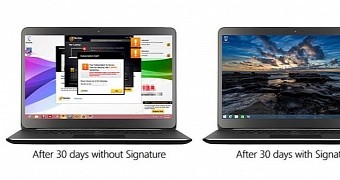Lenovo's Superfish adware caused damage not only to the Chinese manufacturer but also to Microsoft, as the adware has once again emphasized that Windows is still prone to infections even when antivirus protection runs on the target computer.
Obviously, this isn't really the kind of news that Microsoft hopes to hear about its Windows operating system and it's a well-known fact that most people hate junkware and trialware that usually come with a new PC.
As a result, Microsoft tries to offer buyers an alternative, so it now sells Signature Edition PCs that come with a clean version of Windows and without any piece of third-party software that could affect system performance or allow hackers to infiltrate into one's computer.
All available via the Microsoft store
Basically, the easiest way to get your hands on a Signature PC is to head over to the nearest Microsoft store, as the tech giant has promised to offer devices that are entirely clean and with no piece of malware attached to them.
“Some new PCs come pre-installed with programs, toolbars, utilities and screensavers that you might not want and may never use. This can slow down your computer and junk up your Start screen or desktop. When you buy a new PC at Microsoft Store, we ensure there's no third-party junkware or trialware installed,” Microsoft says.
Microsoft also details the issues that computers delivered with junkware could experience after some time, pointing out that virus infections and performance slowdowns are among the most common problems that you could come across.
Request for Windows 10
Interestingly, one of the most voted user requests on UserVoice calls for Microsoft to prevent OEMs from installing third-party apps on new Windows 10 devices, pointing out that, in the end, not only users are impacted but also the Redmond giant itself, because customers could get very disappointed with the performance of the OS.
In reality, however, Microsoft might not have full power over the computers that some OEMs ship, and trying to block them from installing third-party tools could be really difficult, but it remains to be seen if these efforts could indeed lead to increased customer satisfaction or not.

 14 DAY TRIAL //
14 DAY TRIAL //